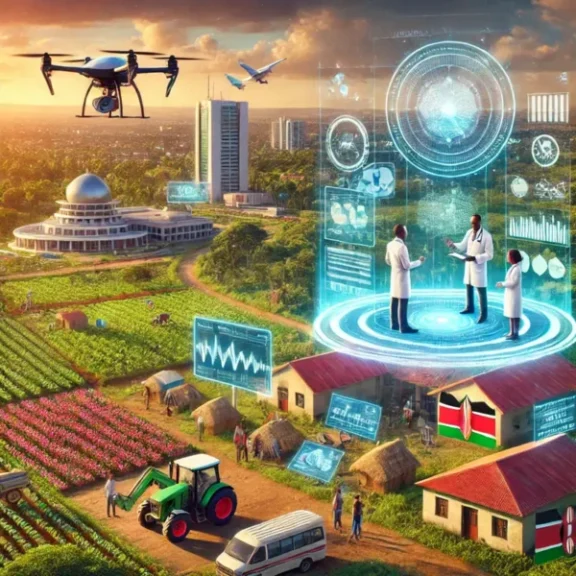AI in healthcare, public service sector, challenges in leveraging AI, and ways to overcome the challenges are going to be the primary focus of this article. With one of the highest AI-readiness rankings in Africa, Kenya stands on the cusp of transformative change, as artificial intelligence (AI) could drive innovation across agriculture, healthcare, education, and public administration. By embracing AI, Kenya can modernize these sectors, potentially boosting economic productivity and improving public services.

Food Security in Kenya
AI can effectively address the various food security challenges faced in agriculture today by optimizing crop management through advanced predictive analytics and innovative precision farming techniques. By utilizing AI-driven solutions, farmers can continuously monitor crop health, track soil conditions, and receive tailored, actionable insights that enable them to enhance yields while substantially reducing resource waste. These technologies not only streamline farming practices but also introduce a new era of data-driven decision-making. As a result, AI empowers farmers to adapt more effectively to climate variability, ultimately enhancing their resilience in the face of unpredictable weather patterns. Additionally, these smart agricultural practices contribute significantly to sustainability efforts, ensuring that agricultural systems can maintain their productivity without compromising the environment for future generations. By integrating AI into agriculture, we begin to see a profound transformation that promotes both economic viability and ecological balance, paving the way for a more secure food future.
AI in Healthcare
Healthcare, another critical sector, also stands to benefit significantly. With telemedicine and AI-driven diagnostic tools, access to quality healthcare can expand even in remote and undeserved areas. AI-powered systems can assist in diagnosing diseases, analyzing medical imaging, and personalizing patient care. These tools enable doctors and healthcare workers to make informed decisions, provide timely treatments, and reduce the pressure on overburdened healthcare facilities. By deploying AI, Kenya can narrow healthcare access gaps and improve the quality of services.
Public Service Sector
In public services, AI’s potential includes improving data management, delivering efficient citizen services, and ensuring transparency. AI can automate administrative tasks, improve service delivery speed, and reduce inefficiencies in government agencies. Predictive analytics can help allocate resources effectively, monitor population growth, and predict future needs. Adopting AI in public sectors supports government transparency and accountability, as data-driven insights allow more objective decision-making and better resource management.
Challenges in Leveraging AI
However, Kenya faces notable challenges in implementing AI, including ethical concerns, data privacy issues, and the risk of deepening existing inequalities. Ethical challenges include the transparency and fairness of AI-driven decisions, as biases in training data can lead to biased outcomes that unfairly impact specific groups. Data privacy and protection remain crucial, as AI systems often rely on large datasets that contain sensitive personal information. Developing a robust framework for data protection, alongside responsible AI use, is essential to maintaining public trust.
In terms of economic inclusivity, there’s a risk that AI could widen socioeconomic divides if only specific segments of the population can access or benefit from these technologies. For instance, if AI-powered agricultural tools are accessible only to large-scale farms, smallholders might be left behind. Ensuring that AI technology reaches marginalized communities and supports diverse needs is crucial to creating inclusive growth.
How to Overcome the Challenges
To overcome these challenges, Kenya must prioritize skills development and invest in a robust technological ecosystem. Training programs that equip people with AI skills, data literacy, and tech competencies are critical for developing a workforce capable of supporting and innovating within the AI sector. Strengthening partnerships between academia, industry, and government can help foster a dynamic tech ecosystem that nurtures startups, accelerates innovation, and ensures ethical AI development.
In conclusion, AI offers Kenya a powerful tool to advance its development goals, modernize critical sectors, and improve the quality of life for its citizens. With careful management, investment in human capital, and adherence to ethical standards, AI can enable Kenya to achieve inclusive growth, strengthen public services, and build resilience across industries. The country’s AI readiness presents an opportunity to lead in Africa’s technological advancement, provided it addresses challenges thoughtfully and equitably.
